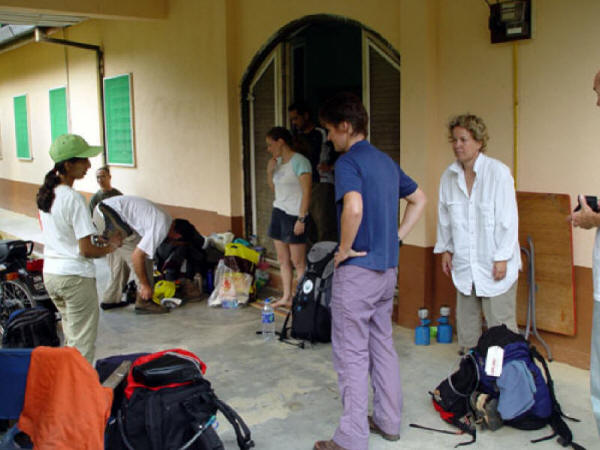Team V preparing to leave for jungle campsite
Home for the next two weeks
The bedside table
Sleeping quarters
House pet
Whip skorpion
Linda and Dominic bathing in the river
Posh cooking facilities at Lubuk Baung
Our well stocked larder at Lubuk Baung jungle camp
Rest and recreational area.
Pit toilets
Duty roster
Local staff member cooking fish
Lunch Team V
Sharpening Parangs
Preparing to leave for "Morning Bats"
Start of the grid at Lubuk Baung.
Processing bats in the field.
Tigga teaching.
Wing puncture
Tiga with trifoliatus
Hipposideros ridley
Hipposideros ridley
Team V taking a break
Yamila, Erin and Javier
Oscar removing a bat from a harp trap
Checking Bat
Hipposideros bicolor
Night bats
Small fruit bar
Oscar checking if a bat has been ringed
Trilobite beetle - Duliticola
Evening recreation
Processing "Evening bats"
Processing "Evening bats"
Erin, Trevor and Steve
Alanna weighing a bat.
Hipposideros diadema
Domimic and Haytham logging data
Draco volans - Gliding lizard
Yamila and Tigga with H. bicolour
A very cute Kerivoula intermedia
Another Kerivoula Sp.
Lesser bamboo bat - Tylonycteris pachypus
Team V
Team V achievments
Our last evening together
Petronas towers by day
Petronas towers by night
We repacked our rucksacks and had them weighed prior to our 8 kilometre hike to the jungle camp. Most of us were carrying between 18 – 20 kg Javier however managed to carry a mighty 30 Kg pack and not flinch!
The sites for hanging our hammocks had been already selected by the previous team so all we had to do was put them up.
Once the hammock was up the next most important thing was to make some sort of stand to put your pack on. This was essential as anything on the forest floor was likely to get a soaking. Inside my pack I had my spare clothing in waterproof zip bags for additional security from damp and bugs.
The finished bedroom with furnishings and rain tarp. As you can see the views from my hammock were stunning.
Resident scorpion under my hammock, you can just make out its claws sticking out of its den. These critters were absolutely no problem and would shoot down their holes the moment I approached.
Another bug often seen on trees at night were non venomous Whip scorpions
We used the river for our drinking water as well as for washing. You just had to make sure that nobody was doing their washing upstream when collecting drinking water.
The orange bins contain treated river water and an ample supply of mango syrup made it reasonable palatable
These pits toilets were a pleasure to use, at least during the day when one was entertained by dung beetles busily going about their business.
We were divided up into five teams each having the name of a local bat.
On a few occasions our diet was supplemented with some locally caught fish.
Ben and Javier checkout the fish watched by Tigga and Trevor
One of the staff local staff members sharpens parangs for a path clearing session. I attacked this job with great enthusiasm but found that I was totally wasted after little more that 90mins during which time I had finished off all the water I was carrying.
Each morning one of the teams was assigned the task of returning all bats caught on the previous night back to the location where they had been caught. They also had to check the traps and process any bats caught overnight.
Angela, Linda and Dominic processing bats in the field.
Tigga teaching me some of the basics of bat identification.
Taking a wing puncture for DNA anaylsis.
Tigga with her favourite bat a cute trifoliatus.
Another cute bat.
We had lots of time to relax during the day between morning and evening bat sessions.
Taking a break and a drink after a tough walk
Here I am taking a turn at removing bats from a harp trap.
Checking a bat removed from the harp trap to see if it has already been ringed. Previously caught bats were recorded and released immediately.
This is me again holding a Hipposideros biclour our groups mascot.
Processing bats in the field at night.
Angela, Haytham, Tigga and Alanna.
Me, this time holding a small fruit bat.
Photo by team member Benedict Lim
Photo by team member Benedict Lim
A wonderful beetle, checkout the cool tail lights.
Here the teams are waiting for the arrival of the "Evening bats" for processing.
Tigga and Trevor processing bats at night.
Trevor and James examine a bat.
Among other vital measurements all bats were carefully weighed.
This one had to be handled with great care!
An unexpected visitor to one of our harp traps
Photo by team member Benedict Lim
I stopped off in KL for a few days before flying back home.

















































 .
.
|

Team V preparing to leave for jungle campsite
We repacked our rucksacks and had them weighed prior to our 8 kilometre hike to the jungle camp. Most of us were carrying between 18 – 20 kg Javier however managed to carry a mighty 30 Kg pack and not flinch!